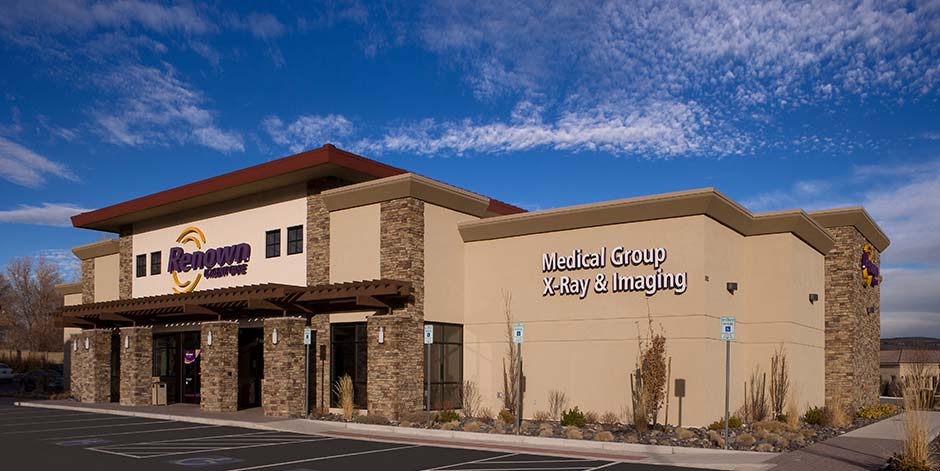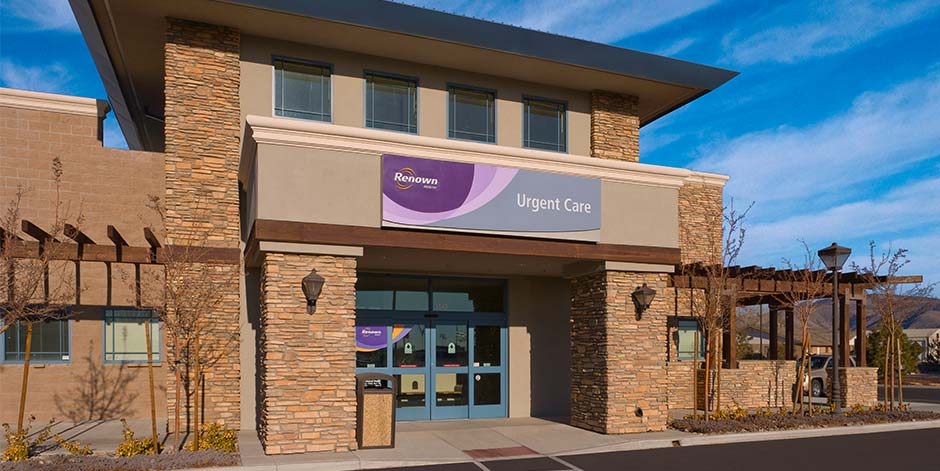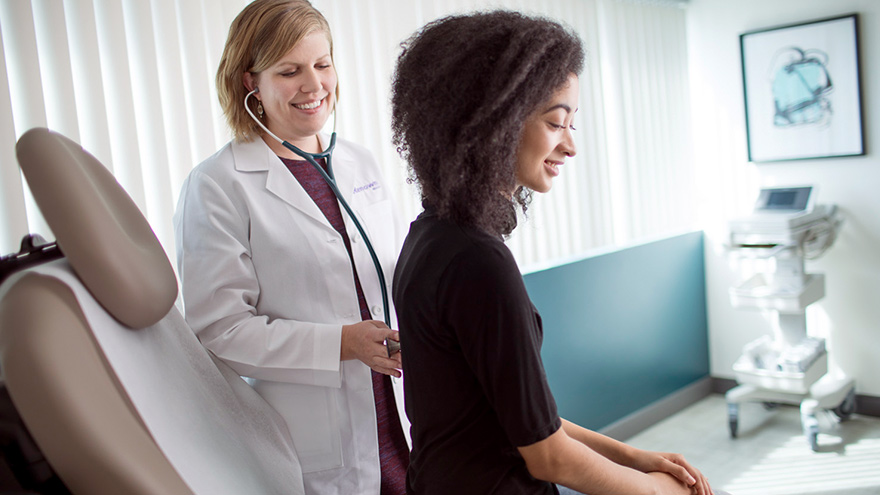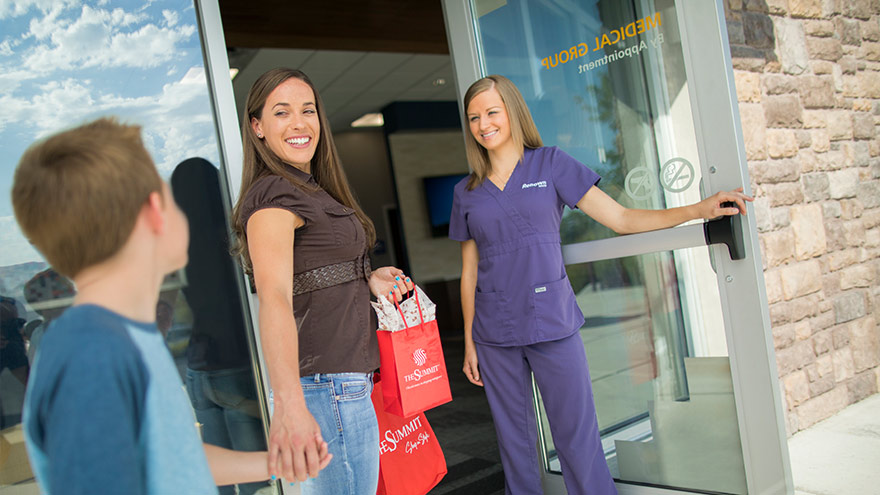Search
Results for 'doctors'
Clear-
Got a Cough, Runny Nose, Sore Throat and Fever? It Might Be RSV Virus
Renown Urgent Care team prepares you to stay alert and safe this season and is available for medical assistance, 7 days a week at 11 locations across northern Nevada. In June, staffers at the Centers for Disease Control and Prevention sent a Health Advisory requesting that clinicians and caregivers watch for the respiratory syncytial virus, usually known as RSV, an infection that puts thousands of toddlers and senior citizens in the hospital each year with pneumonia and deep lung inflammation. According to the CDC, RSV results in roughly 58,000 hospitalizations and 100 to 500 deaths each year among children under five as well as 177,000 hospitalizations and 14,000 deaths among adults 65 and above. RSV was cropping up in 13 southern and southeastern states, the agency warned, and clinicians should test for the virus if kids showed up sneezing, wheezing, or with poor appetites and inflamed throats. Usually a winter infection, RSV is usually gone by June. Instead, this year, it is spreading—and has since continued to spread across the country, and to northern Nevada. “We know that many of the good hygiene habits we developed to defend against COVID-19 disrupted the viral landscape over the past 16 months, suppressing infections from almost every pathogen. Now RSV’s out-of-season return tells us that we need to continue to be on the alert,” says Robert Thole, MD, a physician with Renown Urgent Care. “We are surprised to be seeing so many kids with RSV right now.” “We ask parents and caregivers to keep a watchful eye out for a respiratory syncytial virus (RSV) infection. Symptoms are usually mild and resemble those of the common cold. RSV infection sometimes leads to bronchiolitis, pneumonia, or both. Symptoms of these complications include; difficulty breathing; wheezing; coughing that is getting worse; lethargy, increased tiredness, decreased interest in surroundings, or loss of interest in food,” explains Dr. Thole, who is board certified in family medicine. Catching and spreading the virus People with RSV infection may spread the virus through their secretions (saliva or mucus) when they cough, sneeze, or talk. You can catch the virus by: Touching an object or surface contaminated with the virus and then touching your nose, eyes, or mouth without first washing your hands. The virus can survive for more than 6 hours on countertops and other hard surfaces, such as doorknobs, and for 30 minutes on hands, clothing, or tissue. Close contact. If an infected person coughs or sneezes near you, you could breathe in RSV that is in his or her saliva or mucus. The virus spreads easily in crowded settings, such as childcare facilities, preschools, and nursing homes. Children attending school often spread the virus to their parents and siblings. The incubation period—the time from exposure to RSV until you have symptoms—ranges from two to 8 days but usually is 4 to 6 days. People are most likely to spread the virus within the first several days after symptoms of RSV infection begin and remain contagious for up to 8 days. Babies and young children may spread the virus for at least 3 to 4 weeks. Most children and adults feel better after a week or two. Treatment For an otherwise healthy child who has symptoms of an upper respiratory infection, such as a cough or runny nose, home treatment usually is all that is needed. It is important to watch for signs of complications, such as dehydration. Watchful waiting may not be a good choice when your child with an upper respiratory infection has an increased risk for complications. Watch your child closely if there are symptoms of an upper respiratory infection. If symptoms get worse or new symptoms develop, see a doctor right away. There is no vaccine and few specific treatments aside from supportive care, such as administering pain relievers and fluids. In the most severe cases, some children or adults might need additional oxygen. Not just in kids, older adults at risk Dr. Thole explains, “RSC is not only seen in children. Adults older than 65 have an increased risk of complications following infection with RSV. Pneumonia is a particular risk, especially if other health problems exist, such as chronic obstructive pulmonary disease (COPD) or heart failure. It may take older adults longer to recover from RSV infection and its complications than people in other age groups.” Call 911 or other emergency services immediately if: Your child has severe trouble breathing. Your child's breathing has stopped. Start rescue breathing. Call your doctor now if your baby or child has moderate trouble breathing. Call a doctor if your child: Breathes slightly faster than normal and seems to be getting worse. Most healthy children breathe less than 40 times a minute. Has cold symptoms that become severe. Has shallow coughing, which continues throughout the day and night. Has a poor appetite or is being less active than usual. Has any trouble breathing. Hospitalization Doctors sometimes give a monoclonal antibody treatment to high-risk babies throughout the respiratory season to prevent them from catching the virus or developing a severe infection. Some hospitals have started to increase use of the prophylaxis in response to the recent uptick in RSV cases. “Those kids were being protected,” said Kristina Deeter, MD who was quoted in a July 1st Wall St. Journal article on this topic. Dr. Deeter is a pediatric intensivist and medical director at Renown Children’s Hospital Pediatric Intensive Care and Hospitalist Medicine. Dr. Deeter, who also oversees Pediatrix Medical Group’s critical-care team in dozens of pediatric intensive care units across the country, said hospitals are also considering taking additional precautions in the neonatal intensive-care unit similar to some wintertime protocols. At Renown Children’s Hospital, there were no children hospitalized with RSV throughout the winter season, Dr. Deeter said, when there are normally hundreds of cases in our county- many of which do not need to be hospitalized.” A total of 31 cases have been reported in Washoe County, Nev., since April, and 26 of those occurred within the past three weeks. Preventing infection To prevent infection, or at least to mitigate them, wear masks, stay home when sick, and washing hands could make a difference in how the next viral season unfolds. For more information on RSV, visit renown.org. Renown Urgent Care Renown Urgent Care is available for medical assistance, 7 days a week at 11 locations across northern Nevada providing treatment for a wide range of minor injuries, illnesses and medical concerns that are urgent but not life-threatening. If you require same-day medical attention, you can avoid the long wait times and high prices of the emergency room at 13 convenient sites, including Reno, Sparks, Carson City, USA Parkway, Fallon and Fernley. You can walk-in or book ahead online. About Renown Health Renown Health is a locally governed, not-for-profit integrated healthcare network serving northern Nevada, Lake Tahoe and northeast California. Renown is one of the region’s largest private employers with a workforce of more than 7,000. It comprises three acute care hospitals, a rehabilitation hospital, the area’s most comprehensive medical group and urgent care network, and the region’s largest and only locally owned not-for-profit insurance company, Hometown Health. Renown has a long tradition and commitment to improve the care and the health of our community. For more information, visit renown.org.
Read More About Got a Cough, Runny Nose, Sore Throat and Fever? It Might Be RSV Virus
-
Book Ahead to Make Urgent Care More Convenient
How do you take the waiting game out of your Urgent Care visit? Book ahead! Here’s how this convenient service can help you schedule your appointment and see updated wait times at area urgent care facilities. We’ve all been there, done that: It’s after hours, you need to see a doc, and urgent care is slammed. Renown now offers a convenient option that will enhance your experience. Here’s How Book Ahead Works: From your phone or computer, you can check urgent care wait times around our region. This lets you see if the urgent care by your office is busier than the one closest to home — which may help your planning. Through Book Ahead, you can join the line at a specific urgent care just as you would in person. This allows you to stay home or at work as long as possible so you are more comfortable. Book Ahead When and Where to Receive Care We have many choices when it comes to our medical care. Should you visit a doctor’s office, urgent care, emergency care or make a Virtual Visit? It’s important to know which choice is right for your situation or condition. We asked Luis Palacio, M.D., with Renown Urgent Care to explain the differences and how to make your visit as smooth as possible. If you have been experiencing flu-like symptoms for less than 48 hours, call your doctor’s office. They can then determine if you can be treated with a prescription antiviral medicine. Visit urgent care or the emergency room only if you are unable to eat or drink anything and may be dehydrated, have a fever over 102.5 degrees F, or are experiencing shortness of breath. You can use Renown’s Virtual Visits videoconference service for flu-like symptoms so that you don’t need to leave the comfort of your home and you reduce the risk of spreading the virus to others. Virtual Visits allow you to see an urgent care provider from your home or office using a cellphone, computer or tablet with video capabilities. It is open from 8 a.m. to 6 p.m. Monday through Friday, and 9 a.m. to 4 p.m. Saturday and Sunday. How Do You Book Virtual Visits? Go to Virtual Visits to get started. Here, you’ll learn what virtual check-in is all about: It allows you to stay where you are and receive text notifications once a care provider is almost ready to see you. Click, join a line, and we will ask you some questions about your symptoms. This allows us to make sure you don’t need to call 911 or go to the ER. Reasons to visit the ER include stroke, chest pain, severe shortness of breath, uncontrolled bleeding, seizures and severe allergic reaction. If you answer “no,” you will see the wait times for each urgent care location. If you need to get in right away, you can select the location with the shortest wait time. Or, if time is not an issue and you’d prefer to stay closer to your home or office, you can select that location. Once you’ve selected a location, you input your cell number, name and number of patients. As your appointment gets closer, urgent care will text you with updates on timing. When you get the text message, you can choose to get “more time” and have your appointment pushed back, or tell them you’re ready to be seen and on your way. Learn more about how to Book Ahead at Renown urgent care below.
Read More About Book Ahead to Make Urgent Care More Convenient
-
When to Seek Care for Abdominal Pain
Abdominal pain is one of the most common complaints that brings individuals to the emergency room. We spoke with emergency physician Bret Frey, MD, to ask about when and where to seek care for abdominal pain. Dr. Frey advises that any time you feel something is developing inside your body that is substantially different from what is normal for you, understand that something is wrong. He further explains that warning signs of an acute medical situation include fever, vomiting or a rapid change in function and ability to move due to pain. These symptoms indicate that one needs to be evaluated by a medical professional. This evaluation will include the care team conducting an examination and asking a series of questions to determine if additional diagnostics, such as lab work or imaging, are needed. Be prepared to discuss where the pain is and what it feels like, in addition to how long it’s been bothering you and if it’s constant or intermittent. While appendicitis often comes to mind when thinking about abdominal pain, Dr. Frey says that this is not the bulk of cases that the Emergency Department sees. In fact, often the pain does not have a specific diagnosis, but our team of board-certified emergency physicians are experienced in assessing and caring for those experiencing the acute symptoms he described. “We often don’t come away with an answer about exactly what it is, but we substantially rule out life threats in a very methodical and systematic way,” said Frey. The abdomen includes many organs, including the stomach, liver, small and large intestines, gallbladder and pancreas. In addition, pain stemming from your chest, pelvis or back may be felt in the abdominal area. If you are experiencing abdominal issues that are persistent but not an emergency, talk to your primary care doctor about what you are experiencing, and be prepared to review the history of this pain, medications, allergies and diet. He or she will be a good partner to review conditions such as gas, heartburn, constipation, diarrhea, inflammation or menstrual and ovulation pain. Drinking plenty of water is always an important part of supporting your health.
-
Concussion Risks and Prevention
It’s important to be aware of the risk of a concussion, which can have serious health implications. Susan Park, MD, discusses the effects of concussions and how they can be prevented. According to Susan Park, MD, a Renown Medical Group doctor who specializes in sports and family medicine, concussions are a serious issue — especially among children whose developing brains “are more susceptible to brain injury and long-term effects from concussions.” All parents, coaches and athletes, she points out, should be aware of the risks of concussions and take precautions to avoid them. What is a concussion and how does it occur? Dr. Park describes a concussion as a traumatic brain injury resulting from direct or indirect impact to the head or body, during which the brain shakes back and forth in the skull. This may cause some bruising of the brain. In severe cases, traumatic head injuries can cause bleeding, which if not treated quickly, can be fatal. What are the health implications of a concussion? Symptoms of drowsiness and confusion can be a sign of a concussion after a head injury. Some short-term effects may include headaches, dizziness and difficulty concentrating. Long-term concerns can further include mood disorders, sleep disturbance and problems with cognitive function-concentration, which may affect school performance. What sports carry the highest risk of suffering a concussion? Dr. Park notes participation in any impact sport can result in a head injury. But among school-age kids, she treats more concussions from football and soccer than any other sport. However, during the winter months, skiing and snowboarding injuries can be a common cause of concussions Any blow to your head, neck or upper body can result in a concussion with symptoms including, but not limited to, feeling dazed or confused, dizziness, nausea/vomiting or a headache. Initial treatment of concussions varies depending on severity. Rest, avoiding vigorous activity and a reduced school workload help young athletes recover after a concussion. Dr. Park notes that sometimes further imaging and an ER visit will be required. Otherwise, rest from activities is the main treatment, along with not returning to sports activities until further clearance from a healthcare provider.
-
Virtual Visits – Healthcare You Need At Home
Virtual visits are basically secure, video conferencing visits with your health provider. Of course if you are sick, you want to avoid going outside of your house. With Renown Health’s virtual visit program, you can now see a provider from the comfort of your own home. As we work to keep all of our patients home and healthy, we’re here for any ongoing healthcare needs you have. There are two easy ways to access a virtual visit with Renown Health. If you need an urgent care visit, you can get in line using your MyChart account You can make a virtual visit with some Renown Health providers you see currently Virtual Urgent Care from a Renown Provider By using MyChart, you can now login and request to “Talk to a Doctor.” After filling in some information and confirming your healthcare concern, you will be put into a virtual line. The healthcare team will notify you by text or email when a provider is ready to talk to you virtually. Virtual urgent care visits are available for all ages. Get To Know MyChart Virtual urgent care visits are available for all ages, and can address: Common cold and cough symptoms Muscular, tendon or joint pains not caused by injury Allergy or sinus symptoms Pink eye Urinary discomfort Diarrhea without vomiting Rashes or skin sores Backache Nail problems Screening examination for sexually transmitted illness (without symptoms) Medication refills (not controlled substances) Symptoms for In-Person Urgent Care Visits Shortness of breath Chest pain Abdominal pain Numbness or weakness of any location that is new Traumatic injuries (including eye injuries or something in the eye) Severe pain of any other body location Dizziness or confusion Bleeding from any location High fever (greater than 102 degrees for all ages) Persistent vomiting Loss of vision Ear pain Substance abuse or psychiatric problems Virtual visits are open 9 a.m. through 6 p.m. Monday-Friday and 10 a.m. to 4 p.m. Saturday and Sunday for Nevada residents. Renown Provider Virtual Visits Many primary and specialty care appointments for adults and children are now available virtually. If you have a provider with Renown Medical Group, call 775-982-5000 to see if you can have a virtual appointment from the comfort of your home. MyChart Assistance If you need assistance with your MyChart account, please call 775-982-6686. For all other questions about scheduling and appointments, please call 775-982-5000.
Read More About Virtual Visits – Healthcare You Need At Home
-
Getting Care During The Holidays
Although coined the most wonderful time of the year, the holiday season can unfortunately bring with it injuries and illness. Woke up on Christmas morning with the gift of a sore throat and fever? Sliced your finger carving the delicious turkey you spent all day preparing? While no one ever wants to cut their festivities short, the reality is we should all be prepared with how and where we will receive care should we need it. Are Renown Urgent Care Facilities Open During the Holidays? Renown Urgent Care sees patients 365 days a year, with limited hours on holidays, for medical concerns that are urgent but not life-threatening. Urgent care providers can treat everything from cuts and burns to fevers and allergic reactions and appointments can be booked ahead of time online. If no appointments are available, you may also walk into any of our various urgent care facilities. Conditions and injuries treated at urgent care include: Cuts Fractures Burns Sprains Fevers Allergic reactions Animal bites Rashes Sore throats Does Renown Offer In-Home Care Options on Holidays? If you’d like to see a healthcare provider without leaving the house and exposing others to illness, consider a Virtual Urgent Care Visit. This convenient video conference service allows you to see an urgent care provider from the comfort of your home using a cellphone, computer or tablet with video capabilities. Providers are available for video chat from 9 a.m. to 6 p.m. Monday through Friday, and 10 a.m. to 4 p.m. Saturday and Sunday. Scheduling a Virtual Visit is easy directly through MyChart. Login to MyChart and click on the "Talk to a doctor" video icon within the portal to get started. Before scheduling, be sure your illness or injury is included on the following list to ensure a healthcare provider can assist you virtually: Common cold and cough symptoms Muscular, tendon or joint pains not caused by injury Allergy or sinus symptoms Pink eye (no trauma or something in the eye) Urinary discomfort Diarrhea without vomiting Rashes or skin sores Backache Nail problems Screening examination for sexually transmitted illness (without symptoms) Medication refills (not controlled substances) When Should I Go to the Emergency Room? Urgent care and Virtual Visits are great options when experiencing minor illness or injury and it’s too urgent to see your primary care provider. Renown Emergency Rooms are designed to treat patients who need immediate attention for emergencies, such as: Burns Allergic reactions Broken bones Stitches Skin infections Heart attack Stroke Rashes Venomous stings and bites Asthma attacks Choking or poisoning Fainting, dizziness or confusion Head injuries Seizures Severe bleeding Difficulty breathing Severe headache Eye injuries Severe pain Renown Emergency Rooms are open 24 hours a day, 7 days a week, 365 days a year. For life-threatening emergencies, always call 9-1-1 immediately. We know there is nothing jolly about getting sick or injured during the holidays, but we hope you can find some comfort knowing that Renown Health is here with the care you need, when you need it most.
-
Department Spotlight: Urgent Care
We’ve all experienced a pesky health issue at one time or another that, while not an emergency, is annoying nonetheless. Whether it be a respiratory illness like the flu, a cold or a minor injury such as a cut or a sprain, you have likely felt the need to get seen promptly to start feeling better as soon as possible. So, where do you go? What care team can you turn to? Answer: Renown Urgent Care. This dynamic department of doctors, physician assistants, nurse practitioners, medical assistants, radiology technologists, practice site leaders, patient access representatives and more sees patients every day of the year both in-person and via telehealth for a diverse list of acute health conditions. For patients who need quick yet non-emergent care, the ease and convenience of walking into a practice just a short distance away is a result of our talented team at our Reno, Sparks, Carson City, Fernley and Fallon Urgent Care locations. Immediate Care for Immediate Needs We can all agree that virtually no one enjoys being sick. When you walk into a Renown Urgent Care location (or log onto a telehealth visit), you are there for one reason: to get well. Your entire care team shares that exact same goal, from start to finish. First, you walk into one of our ten Urgent Care locations and are quickly greeted by our friendly patient access representatives, otherwise known as PARs. “As a PAR, we greet our patients at the front and welcome them into the clinic,” said Gillian Kitchell, Patient Access Representative Lead at Renown Urgent Care – Ryland. “We make sure we communicate their symptoms effectively and privately, and we have financial conversations with them as well. Most importantly, we implement compassion and kindness in our conversations to ensure patients feel at ease when they are in our care.” “My role in urgent care is being the first face patients encounter when they walk in the facility,” added Denise Mosqueira, Patient Access Representative at Renown Urgent Care – Fernley. “We check in patients, print out doctor’s notes and handle the clerical side. We collect copays and payments for visits and create estimates for those who do not have active insurance or are choosing to opt out of their insurance for the visit.” “From the moment a patient walks in the door, I try to make them feel comfortable and cared for, regardless of if they are age 2 or 102,” added Elizabeth Kienas, Patient Access Representative at Renown Urgent Care – Damonte Ranch. “A greeting and a smile with accurate demographic and intake allowing patients to get quick healthcare is the full circle goal. We want to get them back home and resting.” Once you’re checked in and called back into the exam area, a medical assistant will guide you through checking your vitals and getting more information about the health issue you’re experiencing. “As a Medical Assistant, my day is spent rooming patients, running patient tests (swabs), assisting providers with procedures and providing excellent patient care,” said Aleassa Roberts, Certified Medical Assistant at Renown Urgent Care – Fernley. “We also scan documents into patient charts, record patient results, schedule imaging appointments and provide wound care. Most days we also perform drug screenings, EKGs and various other smaller duties throughout the day. We provide immediate first aid for emergency patients and have a working relationship with our local EMS providers. Medical Assistants wear lots of hats in Urgent Care!” “In Urgent Care, every day is different; in one day, we will see a variety of patients with all different symptoms,” added Chrystal Hartley, Certified Medical Assistant at Renown Urgent Care – Los Altos. “We are always busy running tests, sending out orders, drawing blood and helping assist with lacerations and procedures. Urgent care is fast paced.” “My day is filled with rooming patients, testing them for illness and helping providers in any way I can,” added Erin Del Porto, Certified Medical Assistant at Renown Urgent Care – Fernley. “Every day can be a little different; it just depends on the day and the patient load. Before patients arrive, a normal day starts with setting up the clinic if it hasn’t been done yet, including checking the temperatures log, unlocking doors and getting the room ready. After that, I go about my duties with checking tests and supplies; then, I huddle with the team before the day starts.” Soon after, your provider will come in and examine you, focusing on your specific concern and giving you laser-focused attention. Their goal is the same as yours: to get you feeling better as quickly as possible. Like any other routine provider’s visit, they will give you the best possible plan of care for your health issue, which may include rest, medications, tests or imaging. And you’ll have peace of mind knowing that the provider caring for you loves and thrives in their role at Renown Urgent Care. “I love working in Urgent Care because we get to provide care for patients that don’t need emergent care but also can’t get in to see their primary care provider,” said Sarah Gentile, APRN, Nurse Practitioner for Renown Urgent Care. “We have the BEST team – and sometimes we even get snacks.” If you end up needing to get imaging done, such as X-rays, our radiology technologists then step in to provide those diagnostic services. “When I get here, I do warm-ups on the X-ray equipment and ensure everything is working properly,” said Steph Hawley, Outpatient Radiology Technologist at Renown Urgent Care – Fernley. “I keep an eye on the Urgent Care patient list and take a guess on which patients will likely need imaging. I also keep an eye on walk-in patients for imaging as well as orders from our primary care office. I wait for imaging orders to be put in, and then I begin the exam on the computer and go set up the room for whatever the exam may be. I will go get the patient from their room and take them to X-ray to complete the exam. Sometimes exams aren't easy or there are obstacles. I roll with whatever happens. I am a big fan of getting the exams done as quickly as possible while still getting quality imaging. I try and keep an eye on the rooms to see if maybe they need to be cleaned for new patients. Our medical assistants are always busy, so sometimes just a little bit could help them out. I also like to fix technical things around here when they are broken, such as computers and printers. I like to work with everyone to get patient care moving.” “I am the radiology technologist for our Urgent Care on USA Parkway, so I take those X-rays when patients need them,” added Patricia Slupski, Outpatient Radiology Technologist for Renown Urgent Care – USA Parkway. “When I’m not busy doing my main role, I assist the patient access representatives in any way I can, from checking in patients, scheduling Occupational Health appointments, answering phone calls and sending out workers compensation paperwork to the employers.” Overseeing it all and helping make the magic happen are the Practice Site Leaders. Under their leadership, each Urgent Care location runs like a well-oiled machine. “I lead the team and help them in different areas that are needed,” said Rachel Hayes, Practice Site Leader for Renown Urgent Care – Damonte Ranch. “I make sure I deliver them with the most up to date information from our other departments and make sure they have all the tools they need to succeed. I support them and listen to them and make sure that everything runs smoothly.” As you can see, each member of the Urgent Care team has an important role to play during your entire visit. They are all here to Fight the Good Fight with you as you continue on your road to recovery.
-
What You Need To Know About Flu Shots
Flu shots don’t just protect those who get vaccinated; they guard everyone, including your family and the community. Renown Health experts help us understand why everyone should get a flu shot, including children, pregnant women and older adults. Ways to Schedule Your Flu Shot Call Us! 775-982-5000 Urgent Care Appointments Renown Pharmacy Vaccinations Make an Appointment via MyChart Need a Doctor? Find One Now Flu Shot Information Whitney Robinson, Renown Health Infection Prevention Expert Chills, body aches, fever and congestion; getting the flu isn’t fun. When you get a flu shot, you’re not just protecting yourself, you’re also helping reduce the total flu cases and hospitalizations. The ideal time to get your flu shot is September through October. This timing allows the vaccine to provide the strongest protection during the length of flu season. However, getting the vaccine later is better than not at all as it's still flu season well into spring. Flu Symptoms In general, influenza (flu) is worse than the common cold and shares symptoms with COVID-19, causing mild to severe illness, and at times can lead to death. Symptoms include: Fever or feeling feverish/chills (not everyone will have a fever) Cough and/or sore throat Runny or stuffy nose Headaches, muscle or body aches Fatigue (tiredness) Vomiting and diarrhea, though this is more common in children than adults Who Needs a Flu Shot? Almost everyone. The Centers for Disease Control and Prevention (CDC) considers it the first and most crucial step in protecting against the flu virus. Therefore, they recommend the yearly flu shot for those six months of age and older. Does the Flu Shot Help with COVID-19? The short answer is no. However, flu vaccines can reduce the risks of flu illness and hospitalization. Therefore, it is crucial for you to get your flu shot to not only protect yourself and the community, but also to help conserve vital, local healthcare resources. CDC Resource: Who Needs a Flu Vaccine and When Kids, the Elderly and Flu Shots Vanessa Slots, M.D., Renown Medical Group The flu is not a passing cold. It is a serious illness that takes lives every year and it happens like clockwork. The onset of flu season is fall and lasts through winter into the spring months. This lung illness is caused by viruses, with yearly outbreaks occurring worldwide. No one is immune, and anyone can catch to the flu. Flu Signs and Symptoms Quick onset of fever Headache Body aches and fatigue along with respiratory symptoms including cough Sore throat and nose Who's at Risk for the Flu? Children and the elderly are at greater risk of complications from the flu, specifically toddlers less than two years old. At this age, their immunity is still developing. Seniors over 65 are also at increased risk because their immune systems have weakened with age. The severity of a child’s symptoms depends on age and prior exposure to the virus. With young children, for example, the flu is more problematic since they cannot talk and communicate their symptoms. As a result, children often experience higher fevers, which can lead to seizures or convulsions. This can be coupled with issues such as nausea, vomiting, diarrhea and poor appetite, all of which put children at risk of dehydration and other complications that can require hospitalization. An average of 20,000 children are hospitalized for flu each year. Pre-Existing Health Issues Ongoing health conditions including asthma, heart conditions, diabetes and more can intensify flu symptoms. Still, many children without risk factors can experience severe flu complications. CDC Resource: Flu Information for Parents Pregnant Moms and Flu Shots Tamsen Carson, PAC, Surgical First Assistant, OB/GYN, Renown Medical Group “During pregnancy, your immune system wards off infection for your baby, leaving you more susceptible to infection and adverse health conditions,” Tamsen explains. She highly recommends flu shots for ALL women during pregnancy. You must receive the injected vaccine versus the live vaccine, a nasal spray, which can cause the flu to occur. Passing Flu Immunity on to Your Baby Also, remember that you will also be able to pass the immunity onto your baby if you breastfeed, which will protect your baby from the flu. CDC Resource: Flu Safety and Pregnancy
-
Make Hydration a Priority for Your Health
As the temperatures skyrocket and we return to more outdoor activity, one thing is certain: you must hydrate to stay cool, healthy, and functional. But how much water do you need, and what are some easy ways to ensure you are getting enough? Aurosis Reddy, DO a family medicine provider with Renown Medical Group, shares what you need to know. How Much Water Is Enough? Experts agree that recommended daily water intake can vary depending on different factors such as your weight, metabolism, location, diet, physical activity, and health. As a rule of thumb, women should aim for a daily fluid intake of 91 ounces, and men should aim for 125 ounces. It is important to listen to your body and recognize when you might need to increase your water intake. For example, if you’re partaking in strenuous exercise, or spending time outside in the heat, you’ll want to give your body more water and electrolytes to function properly. How Can I Tell If I Am Dehydrated? Decreased coordination Fatigue Less urination Dizziness Dry, sticky lips and mouth Increased thirst Headache
-
 Renown Urgent Care - Summit RidgeRenown Urgent Care - Summit RidgeHours
Renown Urgent Care - Summit RidgeRenown Urgent Care - Summit RidgeHours
Mon-Fri8 a.m. - 7 p.m.Sat-Sun9 a.m. - 5 p.m. -
 Renown Urgent Care - Los AltosRenown Urgent Care - Los AltosHours
Renown Urgent Care - Los AltosRenown Urgent Care - Los AltosHours
Mon-Sun8 a.m. - 9 p.m. -
 Renown Urgent Care - FernleyRenown Urgent Care - FernleyHours
Renown Urgent Care - FernleyRenown Urgent Care - FernleyHours
Mon-Fri9 a.m. - 7 p.m.Sat-Sun9 a.m. - 5 p.m.





.png?rev=7596287f0a53428ca00fd0b295a1ae09)

